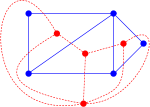The idea that geometry in Gothic architecture was used to structure ideas, rather than the edifice itself, has come up before here at Mathematics Rising. But I would like to focus a bit more on this today because it illustrates something about mathematics, and mathematics’ potential, that the modern proliferation of information may be obscuring. […]
|
|||||
|
Not too long ago I wrote about entropy, and what has come to be known as Maxwell’s demon – a hypothetical creature, invented in 1871 by James Clark Maxwell. The creature was the product of a thought experiment meant to explore the possibility of violating the second law of thermodynamics using information to impede entropy […] First, I would like to apologize for posting so infrequently these past few months. I have been working hard to flesh out a book proposal closely related to the perspective of this blog, and I will be focused on this project for a bit longer. However, a TED talk filmed in Paris in May came […] I just listened to a talk given by Virginia Chaitin that can be found on academia.edu. The title of the talk is A philosophical perspective on a metatheory of biological evolution. In it she outlines Gregory Chaitin’s work on metabiology, which has been the subject of some of my previous posts – here, here, and […] A recent issue of New Scientist featured an article by Kate Douglas with the provocative title Nature’s brain: A radical new view of evolution. The limits of our current understanding of evolution, and the alternative view discussed in the article, are summarized in this excerpt: Any process built purely on random changes has a lot […] I’ve been reading Rebecca Goldstein’s Incompleteness: The Proof and Paradox of Kurt Gödel which, together with my finding David Mumford’s Why I am a Platonist, has kept me a bit more preoccupied, of late, with Platonism. This is not an entirely new preoccupation. I remember one of my early philosophy teacher’s periodically blurting out, “See, […] 
I’m not sure what led me to David Mumford’s Why I am a Platonist, which appeared in a 2008 issue of the European Mathematical Society (EMS) Newsletter, but I’m happy I found it. David Mumford is currently Professor Emeritus at Brown and Harvard Universities. The EMS piece is a clear and straightforward exposition of […] I think often about the continuity of things – about the smooth progression of structure, that is the stuff of life, from the microscopic to the macrocosmic. I was reminded, again, of how often I see things in terms of continuums when I listened online to a lecture given by Gregory Chaitin in 2008. In […] 
Can the presence of intelligent behavior in other creatures (creatures that don’t have a nervous system comparable to ours) tell us something about what ideas are, or how thought fits into nature’s actions? It has always seemed to us humans that our ideas are one of the fruits of what we call our ‘intelligence.’ And […] A recent post on Mind Hacks challenged the perspective outlined in a NY Times op-ed by psychologist Gary Marcus with the title Face It, Your Brain Is a Computer. The title of Marcus’ piece may be misleading. The brain/computer analogy that he proposes is more a strategy than a theory. But the rejection of brain/computer […] |
|||||
|
Copyright © 2025 Mathematics Rising - All Rights Reserved Powered by WordPress & Atahualpa |
|||||


Recent Comments